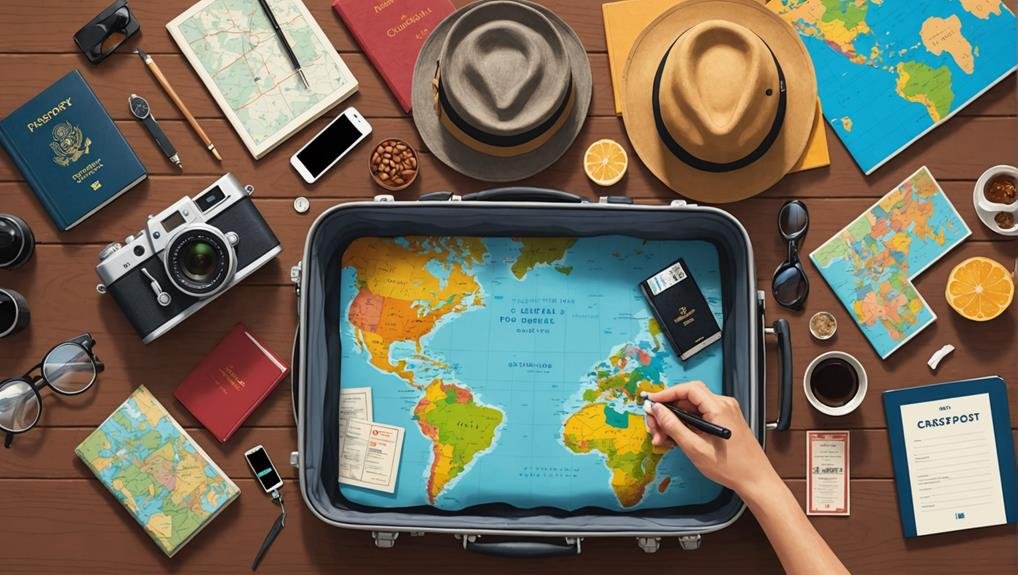When you relocate to a new culture, grasping that culture shock is genuine and can impact anyone becomes vital. As you navigate unfamiliar traditions and social standards, the initial enthusiasm frequently shifts to irritation and bewilderment. But rest assured, there are practical methods to alleviate this adjustment. You can address the obstacles by actively engaging in community activities, displaying authentic interest in your novel surroundings, and seeking assistance from recent connections and family members in your homeland. How can acquiring the local dialect and contemplating your encounters additionally assist this progression?
Key Takeaways
- Immerse in local customs and traditions to connect with the host culture.
- Build a supportive network of peers, advisors, and cultural clubs.
- Stay open-minded and explore new foods, languages, and practices.
- Engage in regular communication with family and friends back home.
- Utilize language learning resources and practice speaking with locals.
Understanding Culture Shock

Have you ever felt completely out of place in a new setting? That’s culture shock, the anxiety that hits you when adjusting to a different culture. It’s common among new students at Harvard who suddenly find themselves immersed in American societal norms. Understanding culture shock is crucial to overcoming the challenges of adapting.
Culture shock can lead to disorientation, confusion, frustration, and isolation. You might struggle to integrate, feeling like an outsider despite your best efforts. Confusion and frustration arise from the variations in social norms, communication styles, and daily routines. However, cultural adjustment typically unfolds over several weeks or months, gradually easing the initial discomfort.
Understanding the phases of culture shock helps you navigate this challenging period. It’s not just about learning new traditions or language; it’s about immersing yourself in the new culture while maintaining your identity.
This cultural adjustment process involves recognizing that these feelings are normal and temporary. By anticipating the challenges of adapting to a new culture, you can better prepare yourself mentally and emotionally, making the change smoother and less overwhelming.
Phases of Culture Shock
Understanding culture shock sets the stage for grasping the distinct phases you’ll encounter during cultural adjustment. The Phases of Culture Shock typically include the Honeymoon, Rejection, and Recovery stages. Initially, in the Honeymoon phase, you may find everything new and exciting. However, as you progress into the Rejection phase, reality sets in. You may experience homesickness, frustration, and even health problems here.
Language variances can become particularly challenging during this Adjustment Period. You might spend longer hours studying or trying to understand local conversations, which can lead to feelings of frustration and withdrawal. It’s common to contemplate leaving early due to these overwhelming emotions.
As you shift into the Recovery phase, you’ll begin to find a balance. The initial excitement may have worn off, but you’ll start to enjoy your new environment more consistently. Your perspective on life in the new culture will become more balanced, and you’ll find ways to adapt despite the language barriers and previous frustrations. This stage signifies improved mental and emotional well-being, marking a significant step in overcoming culture shock.
Ways to Diminish Culture Shock

To minimize culture shock, immerse yourself in the host culture and stay open-minded to new experiences.
Engage in activities that interest you, and build connections with locals and fellow expats.
Maintain a strong support system with friends, family, or counselors to help you navigate the adjustment smoothly.
Embrace Host Culture
Immersing yourself in the host culture can greatly reduce culture shock, making your adjustment smoother and more enjoyable. Embracing your new environment with an open mind is key to adapting successfully. Plunge into local customs, participate in traditions, and appreciate different perspectives. Such immersion helps you understand the host culture better, easing the change and diminishing feelings of disorientation.
Engage in activities that bring you closer to the local community. Joining athletic activities or regular physical exercise can be a fantastic outlet for stress and a way to meet new people. Forming meaningful relationships with individuals from diverse backgrounds enriches your experience and provides a sense of belonging. By taking these steps, you’ll find adjusting and embracing your new surroundings easier.
Consider these emotional benefits:
- Connection: Feel a sense of belonging by forming relationships with locals.
- Growth: Broaden your horizons and grow personally by experiencing new customs.
- Confidence: Increase your self-assurance by navigating and understanding different cultural norms.
- Joy: Discover the joy in new traditions and celebrations.
- Resilience: Build resilience by successfully overcoming culture shock.
Maintain Support System
Building and maintaining a robust support system is essential for diminishing culture shock. Start by connecting with peers, advisors, and cultural clubs. These connections offer emotional support and help you navigate the complexities of a new culture.
Engage in regular communication with family and friends back home; their familiar voices can be incredibly soothing and help you cope with feelings of isolation.
Seek out individuals from similar backgrounds or home countries to share experiences and provide mutual support. This can be incredibly reassuring, as they understand your unique challenges.
Participate in campus social activities, events, and clubs to build new connections and combat loneliness. These interactions will help you feel more integrated into your new environment.
Don’t overlook campus resources and counseling services. Many institutions offer support groups and workshops designed to help international students adjust. These resources can provide professional guidance and additional emotional support, helping you navigate your new life more smoothly.
Stay Open-Minded
Frequently, staying open-minded can greatly facilitate the adjustment to a new culture. By keeping an open mind, you allow yourself to embrace new cultural experiences and perspectives, which can significantly diminish the impact of culture shock. Open-mindedness enables you to learn from cultural differences and challenges, turning potential obstacles into opportunities for personal growth.
When receptive to unfamiliar customs and traditions, you foster cultural adaptation and understanding. This approach enriches your study abroad experience and helps you build meaningful connections with people from diverse backgrounds. Here are some ways to cultivate open-mindedness and lessen culture shock:
- Explore local customs and traditions: Immerse yourself in the everyday practices and rituals of the new culture.
- Try new foods: Enjoying local cuisine can be a delightful and enlightening experience.
- Learn the language: A few phrases can bridge gaps and show your willingness to adapt.
- Ask questions: Show genuine curiosity about cultural differences and viewpoints.
- Reflect on your experiences: Take time to think about how these new experiences are shaping your personal growth.
Embracing differences with an open mind makes cultural adaptation smoother and enriches your journey with deeper cultural understanding.
Learning the Language
Learning the host country’s language is one of the most effective ways to adapt to a new culture. Immersing in language learning enhances your understanding of the culture and notably improves communication with locals. Your interactions become more meaningful and respectful when you grasp both words and the nuances of body language and manners.
You can utilize various online resources, such as language apps and websites, to get started. These tools offer flexibility and can be tailored to your pace. Hiring tutors or enrolling in language classes can also provide structured learning and personalized feedback, accelerating your progress.
Making an effort to speak the local language shows respect for the culture and is often appreciated by the community. It opens doors to deeper connections and enriches your overall experience.
Don’t shy away from practicing with locals; your attempts will likely be met with encouragement and patience, no matter how imperfect.
Be Curious

Curiosity is your gateway to truly understanding and appreciating a new culture. When genuinely curious, it shows a deep respect and interest in the people around you. Asking questions about other cultures allows you to gather rich cultural information and fosters meaningful connections. Remember to show sensitivity to others’ willingness to share and avoid passing judgment on practices that may be unfamiliar to you.
When exploring new cultures, approach every interaction with an open-minded attitude. Choose the right time and place to ask questions, ensuring your inquiries are respectful and considerate. This way, you’ll encourage open dialogue and create a comfortable environment for sharing.
Being curious isn’t just about asking questions—it’s about immersing yourself in the experience and showing a genuine interest in learning. Here are some ways to evoke emotion and deepen your cultural understanding:
- Listen actively and attentively to stories and explanations.
- Participate in local traditions and customs with enthusiasm.
- Express gratitude for the cultural insights shared with you.
- Reflect on your cultural assumptions and biases.
- Celebrate the diversity you encounter and cherish the new perspectives gained.
Put Energy Into Understanding
To truly adapt to a new culture, you need to put energy into understanding it. Embrace cultural contexts and avoid quick judgments by focusing on learning the rationale behind local behaviors. Appreciating different perspectives will open up a richer, more respectful experience.
Embrace Cultural Contexts
Adapting to a new culture requires more than surface-level engagement; it demands a genuine effort to understand the underlying reasons behind cultural practices. It would be best if you took the time to explore the “why” behind the customs and traditions you encounter. This means you should learn about unfamiliar cultural behaviors and inquire about their origins.
To truly embrace a new culture, you should show a genuine interest in learning about different perspectives. This enriches your understanding and helps you connect more deeply with the people around you. When you take the time to understand cultural practices, you gain insights that make your experience more meaningful and rewarding.
Here are some ways to evoke a deeper connection and understanding:
- Show curiosity: Ask questions and listen intently to the answers.
- Be patient: Understanding cultural contexts takes time and effort.
- Be respectful: Choose the right time and place to inquire about sensitive topics.
- Open your heart: Embrace different perspectives without judgment.
- Celebrate diversity: Find joy in learning about cultural differences.
Avoid Quick Judgments
One of the most important steps in adapting to a new culture is avoiding making quick judgments. You must grasp cultural contexts and learn the rationale behind cultural practices to do this. Instead of jumping to conclusions, focus on understanding why people act the way they do. This will help you embrace different perspectives and avoid hasty decisions.
When you encounter something unfamiliar, take a moment to reflect on misunderstandings. Consider multiple explanations for behaviors rather than assuming your initial interpretation is accurate. Recognize that your cultural lens can influence your perceptions, so practice patience and open-mindedness. Giving yourself time to adjust and truly understand the new cultural norms is crucial.
Additionally, choose the right time and place to inquire about other people’s cultures. Show genuine interest and sensitivity to their willingness to share. This will demonstrate respect and help you gain deeper insights. Putting energy into understanding rather than judging will foster better relationships and enrich your cultural experience. Ultimately, focusing on learning and reflecting on misunderstandings will make your adaptation process smoother and more rewarding.
Learn Different Perspectives
Embracing different viewpoints begins with a genuine curiosity about the world around you. When you display authentic interest in learning about other cultures, you naturally ask questions and explore the reasons behind cultural practices. It’s vital to avoid passing judgment and instead work towards understanding the rationale behind what you observe.
Show sensitivity by selecting the appropriate time and place to inquire about cultural differences. This approach demonstrates respect and opens the door for deeper connections. Focus on learning rather than criticizing; this mindset will help you embrace different perspectives and better understand the world.
It’s important to practice patience and open-mindedness. By considering multiple explanations for behaviors and practices, you can better appreciate the diversity of human experiences. Here are some ways to evoke a deeper emotional connection with the culture you’re exploring:
- Experience the warmth of new friendships as you ask questions and listen actively.
- Discover the delight of finding shared values and common ground.
- Find serenity in showing sensitivity and respecting others’ customs.
- Enhance wisdom by embracing different perspectives and expanding your worldview.
- Develop resilience through patience and open-mindedness in challenging situations.
Pause and Reflect

Taking a moment to pause and reflect is essential when exploring a new culture. You need to understand that cultural differences are vast and complex. By reflecting on these differences, you can appreciate diverse perspectives. Practice open-mindedness and recognize how your cultural lens influences your perceptions. This awareness helps you embrace viewpoints that may initially seem foreign.
When encountering unfamiliar behaviors, consider multiple explanations instead of jumping to conclusions. This approach allows you to avoid hasty judgments and fosters a deeper comprehension of the cultural context.
For instance, a gesture or tradition that seems odd to you might hold significant meaning within the local culture. Reflecting on these nuances helps you appreciate the richness of your experiences.
Patience is key. As you navigate through new cultural landscapes, give yourself time to adapt. Reflecting on your experiences allows you to process them effectively. Adapting to a new culture is a journey, not a race.
Seek Support From Others
Building a supportive network is essential when adapting to a new culture. Connecting with cultural allies can make your journey smoother by providing valuable insights and shared experiences.
Engage with expats who’ve already navigated the cultural adjustments you’re facing. Their perspectives can help you navigate the cultural confusion and acclimate to the new norms.
To build a supportive network, reach out to people who’ve gone through similar challenges. Please share your experiences and learn from them. This camaraderie eases the process and fosters a sense of belonging.
Don’t hesitate to ask for guidance; having someone clarify the nuances of your new environment is invaluable.
- Feeling understood: Imagine the relief of sharing your challenges with cultural allies who truly understand it.
- Gaining wisdom: Expats offer priceless advice to save you from common obstacles.
- Building confidence: Knowing you have a supportive network makes tackling new norms less overwhelming.
- Reducing isolation: Connecting with others helps alleviate loneliness in a new place.
- Finding joy: Shared laughter over cultural confusions can turn challenges into cherished memories.
Preparing to Live in a New Culture

Preparation is the cornerstone of a successful cultural change. Doing your homework is vital before you begin your journey to adapt to a new culture. Start by researching the host country’s culture, politics, and history. Understanding these elements will provide a solid foundation for cultural awareness and ease your cultural adjustment.
Next, connect with study abroad alumni and international students. They can offer firsthand insights and practical tips for navigating your cultural shift. Engaging with them can also help you prepare for cultural immersion and avoid common pitfalls.
Another effective strategy is to absorb media from the host country. Watch movies, listen to music, and follow the news to familiarize yourself with cultural norms and practices. This will make you feel more at home once you arrive.
Additionally, learn about the host country’s economic conditions and cultural diversity. Knowing what to expect economically and socially will help you adapt more smoothly.
Utilize resources like books, online platforms, and cultural training websites. These tools can greatly enhance your preparation and make your cultural adjustment more manageable. By taking these steps, you’ll be well-equipped to thrive in your new environment.
Conclusion
Adapting to a new culture isn’t easy but incredibly rewarding. Embrace local customs, participate in community activities, and build connections with diverse individuals. Maintain a support system by staying in touch with loved ones and engaging with peers and advisors. Stay open-minded, explore new experiences, and learn the language to deepen your understanding. You’ll adapt and thrive in your new environment by putting energy into understanding and seeking support.
FAQs
1. What Strategies Do You Use to Adapt to New Culture?
You should engage with local students, explore online resources, and seek advice from seasoned travelers. To immerse yourself fully in the local community, embrace cultural diversity, join clubs, volunteer, and attend events.
2. What Are the 4 Stages of Adjusting to a New Culture?
The four stages of adjusting to a new culture are the Honeymoon phase, the Frustration phase, the Adjustment phase, and the Acceptance phase. You’ll experience excitement, challenges, gradual comfort, and full integration.
3. How Long Does It Take to Acclimate to a New Culture?
Acclimating to a new culture might take 3 to 6 months, but the time varies. Language skills, past cultural exposure, and personal resilience can speed up or slow the process.
4. What Is the Process of Adapting to a New Culture?
You’ll adapt to a new culture through research, engaging with alums, and consuming local media. Embrace the language, understand body language, and interact with locals. Patience and openness are key as you navigate this personal development journey.

